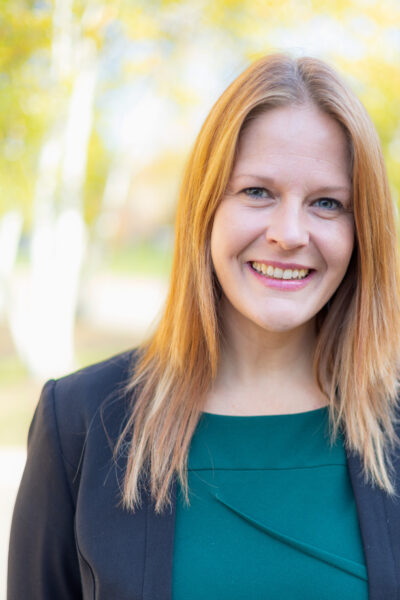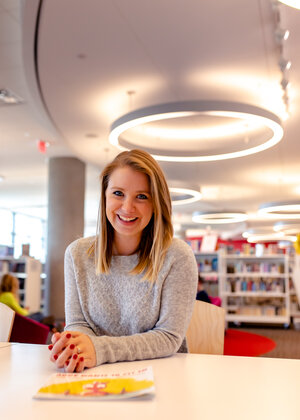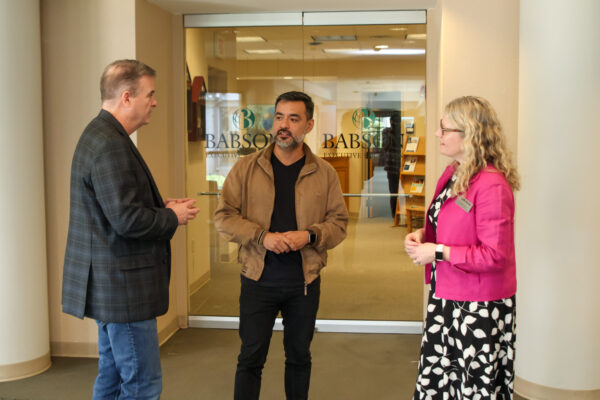Kerri Hayes, a ventures operations lead at Raytheon BBN and recent graduate of Babson’s Executive Entrepreneurial Leadership Certificate (EELC) program, knew that in order to continue innovating in her role, she had to prioritize her professional development and find a business program that ultimately challenged her usual perspective.
Familiar with Babson College’s reputation in entrepreneurship education, Hayes discovered its EELC program. Built upon two foundation courses and several electives, all taught with entrepreneurial leadership at their core, the program felt intentional for her role and attainable alongside the demands of her career. She said the most impactful course she took was the Leadership Program for Women & Allies.

“Working in an industry with mostly men, I didn’t have the opportunity to work with and learn from women leaders nearly as much,” Hayes said. “For five days, I was surrounded by phenomenal women leaders, both faculty and students. This course quickly broke down walls I had apparently put up. I didn’t realize how much I needed this course to look at things from a different perspective until I went through it.”
Hayes’ understanding that a certificate program such as the EELC will help her rise in a competitive workforce is a commonly shared belief among the professional world today. Over the past few years, there has been a significant increase in hiring individuals with industry microcredentials to help expand and diversify a company’s talent pool, and professionals such as Hayes are standing out as a result.
Microcredentials certify the learning outcomes of short-term learning experiences. They offer a flexible, targeted way to help people develop the knowledge, skills, and competences they need for their personal and professional development. According to the World Economic Forum’s most recent Future of Jobs Report, 61 percent of workers will require retraining between now and 2027, further validating the need for these types of specialized, skills-focused training programs.
The report demonstrates that some of the top skills on the rise were leadership focused, such as creative thinking, agility, and resilience. In line with these growing trends, Hayes opted for a program that teaches with an entrepreneurial lens and emphasizes these types of sought-after leadership skills.
New Connections, Fresh Outlook
Learning from vastly different perspectives is one of the most valuable elements of enrolling in a microcredential program, where peers can come from all walks of life with diverse professional backgrounds, in varying stages of their career.

Another individual who learned a great deal from her diverse cohort is Jacky Lamenzo Sinha, founder of Lemon House Publishing, a writing enrichment program that guides children through the entire process of writing a book, all the way to publishing and selling on Amazon. Sinha’s “a-ha” moment happened in the Entrepreneurship Bootcamp course, where the end goal was to execute a startup pitch. She had pitched many times before, always directing her call to action to parents to get them invested in her idea. But, what she really wanted—and needed—was for more teachers to buy in, so that she could create a sustainable and growing business that operates more efficiently without her presence needed in every aspect of the company.
“The day before the pitch, my classmate said, ‘So, your mock pitch tomorrow is for teachers?’ ” Sinha said. “And, I thought, ‘Oh, of course! I don’t need to pitch the parents anymore!’ ”
She went home that night and fully re-created her pitch with teachers in mind. This turning point allowed her to step back, loosen the reins, and trust other people to help her grow her business.
“Just being in the Babson environment forced me to think differently,” she said.
Finding a Sense of Purpose
This curiosity and shift in perspective resonated for venture builder Vinicius Romano, too. A business transformation leader at global mining company Vale, Romano sets out to constantly innovate efficiencies, productivity, safety, and automation, while also seeking opportunities to create new business for the company.

He craved the entrepreneurial focus of Babson’s EELC program. What he got back from the program was a deeper sense of purpose and a clear understanding of his personal brand, and how to effectively share it in the workplace and beyond.
For Romano, Sinha, and Hayes, what set the experience apart from other skills-training programs was the level of care and commitment the faculty gave toward each participant’s success. Because of the intimate size of the groups, the personalized teaching style and hands-on nature of the program, students often had ample opportunity for one-on-one time with faculty and advisors.
Hayes particularly appreciated Smaiyra Million P’21, executive director of the Arthur M. Blank Center for Entrepreneurship, for her firsthand experience as a CEO and an investor, as well as her genuine care and attentiveness both in and outside the classroom, whether Million was advising her in the women’s leadership and allies program, joining the cohort for a meal, or attending a networking event with them.
“With her being a ‘pracademic’ (practitioner-academic), I appreciated her honesty with her career experiences,” Hayes said. “I found her very relatable given both of us work in male-dominated industries and as a working mother.”
With trends around required training in the workplace on the rise, and the increasing importance of cognitive skills such as curiosity, resilience, agility, and lifelong learning, the decision to invest in continued education becomes easy, especially when that payoff is felt firsthand, as it was for Hayes, Sinha, and Romano.
“For me, this program is a great way to be on a path to an end goal,” Sinha said. “I am a student at heart, so having a curriculum to follow and choosing classes that work for my schedule and life has been incredible. I am now equipped with many more resources, ideas, and strategies to grow my business successfully.”
Posted in
Campus & Community, Entrepreneurship of All Kinds
More from Entrepreneurship of All Kinds »
